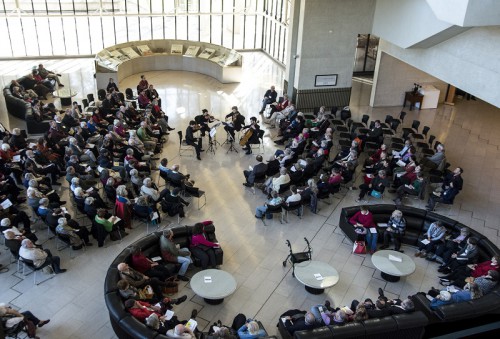“SOUNDS on Site V: From the Letter to the Law” was a testimony to excellent concert programming. Spread across three venues—The National Library Foyer, Reconciliation Place and the acoustically marvellous High Court—this concert featured works by three of Australia’s finest contemporary composers and their contemporaries.
Filtering down from the Library’s upper landing, Peter Sculthorpe’s mournful In Memoriam for trumpet and strings opened the concert and was followed by a true classic of Australian modernism; Nigel Butterley’s The Formlessness of Cold. Butterley, who turns 8o this year (like his contemporary Arvo Pärt), created this work as an exploration of early serialist language. Tone clusters, accented grace notes and a nod to klangfarbenmelodie combine to create a pointillistic soundscape unified only by pedal tones. An electric guitar evokes harps or bells in a counterpart to mournful winds. The elegance of this work’s structure is still impressive, even 45 years after it was written.
Also noteworthy was Andrew Ford’s A Pitch Dark Night, for baritone, piccolo, trumpet and piano. From its opening pianissimo chords, Ford’s work expands into expressionism in a manner reminiscent of Gorecki’s Symphony No. 3. Baritone David Greco was sublime with his understated vibrato and fine lieder style. Utterly modern and devoid of affectation, Ford’s A Pitch Dark Night brought the first part of this concert to a poetic conclusion.
The walk to the High Court from the National Library was punctuated by various semi-concert experiences—sounding sculptures in Reconciliation Place and a commanding performance of Messiaen’s Appel interstellaire by Gergely Mályusz in Commonwealth Place Corridor. The sunshine held out long enough for a pleasant walk from Library to Courthouse.
Glancing at the concert program, one might have been forgiven for thinking one work was out of place. Across all three venues, every work except one was written after 1900. The exception, Giovanni Gabrieli’s 16th Century Omnes Gentes opened the final chapter of this concert at the High Court. That stunning acoustic spaces was filled with the ethereal sound of The Song Company and YAFF Vocalists, divided into discrete choruses and surrounding the audience from high balconies. The combination of angelic soaring voices and subtle accompanying brass left everyone, even the court security staff, spellbound.
After an interlude, excerpts from Phillip Glass’s String Quartet No. 3, the Song Company and YAFF vocalists concluded the concert with Arvo Pärt’s Da pacem Domine, a work dominated by similar suspensions and staggered entries as we’d heard in the preceding Gabrieli. As Pärt’s last notes rang out in that vast auditorium, the audience remained silent for a moment, sunshine spilling over them from those huge High Court windows—a second or two of magic.
The post Review / Magic works by three contemporary composers appeared first on Canberra CityNews.
